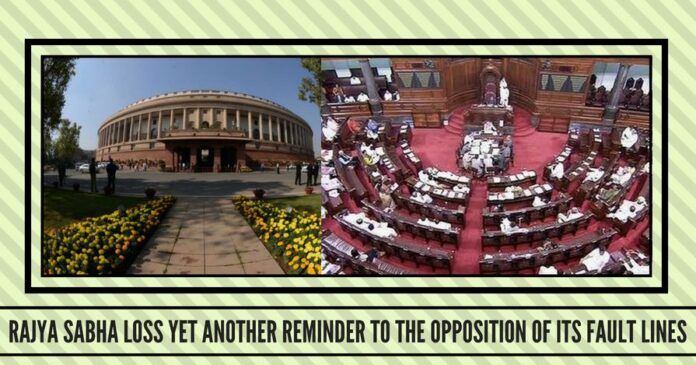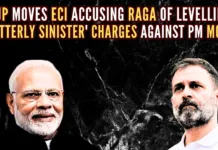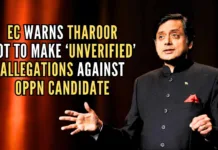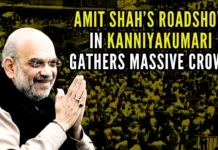
With two back-to-back defeats in Parliament — one each in both the Houses — the opposition is looking to be anything but united
When opposition parties failed in their no-confidence motion against the Modi Government, the explanation offered was that they never had the numbers in the first place and that the motion was only an occasion to put the regime on the mat — never mind that Congress leader Sonia Gandhi had confidently said before the vote that the opposition had the numbers; and the fact that there were other ways to corner the Government in Parliament. But when the Congress-led UPA failed to get its nominee elected in the contest for the post of Deputy Chairman of the Rajya Sabha on August 9, there simply was no credible excuse for the humiliation. The BJP-led NDA does not have a majority in the House, and yet it cobbled together the numbers to get its candidate elected by a comfortable margin.
The BJP played its cards well. Realising that it did not have a majority on its own, the party decided to field a candidate belonging to one of its partners
The manner in which the two sides managed the contest is a study in contrast. The BJP named as its candidate, a member belonging to its ally, the Janata Dal (United); the Congress selected one from its stable. There had initially been some talk that the Congress would back a candidate from the Nationalist Congress Party, with whom it has been working closely to forge strategies against the BJP. But that didn’t materialise. Had that candidate — from Maharashtra — from the NCP been chosen, there could have been a possibility that the Shiv Sena, which has already served notice of a divorce to the NDA, could have supported the UPA candidate. It had also been speculated that the Congress would not be averse to backing a candidate from the non-UPA ranks, including the Trinamool Congress. Nothing came of that, either.
The BJP played its cards well. Realising that it did not have a majority on its own, the party decided to field a candidate belonging to one of its partners. The name of Naresh Gujral of the Shiromani Akali Dal was initially in the news but eventually, a low-profile candidate from the Janata Dal (United) was chosen. In doing so, the BJP sent a signal of being accommodative to the aspirations of its allies. The decision also brought the JD (U) and the BJP closer at a time when rumours were doing the round that the two parties had been drifting apart in the run-up to the Lok Sabha election.
This is the first study in contrast. The second is the extent of outreach that the Congress and the BJP showed in preparation for the contest. Senior BJP leaders reached out to non-NDA/non-UPA parties such as the Biju Janata Dal, the TRS and the AIADMK, soliciting support to the NDA candidate. Bihar Chief Minister and JD (U) leader Nitish Kumar too spoke to some of them. He even reportedly called up Delhi Chief Minister and Aam Aadmi Party leader Arvind Kejriwal. The Congress, on the other hand, did nothing on a similar scale. The AAP, because it could not possibly support a candidate backed by the BJP, could have possibly voted for the UPA candidate. It later complained that Congress president Rahul Gandhi did not even bother to seek its help; the AAP eventually did not participate in the voting.
Interestingly, opposition leaders, participating in discussions in television studios after the Rajya Sabha Deputy Chairman’s election, have been busy relating ‘how’ the BJP won. Instead, they ought to be giving some thought to how they lost.
The Congress’s level of mismanagement was such that it could not even get the support of the Peoples Democratic Party with which the BJP had a bitter parting only recently, nor could it win over the YSR Congress or the Telugu Desam Party which had opposed the NDA on Andhra Pradesh being denied special category status. To make matters worse, some MPs belonging to the UPA did not turn up in the House under one pretext or the other. Adding insult to injury was the cross-voting of an RJD member, Ram Jethmalani, who backed the NDA candidate!
At one level, therefore, it was numerical mismanagement of the highest order by the Congress. But that is only part of the story. The real takeaway from the UPA’s defeat is the failure of the Congress to present itself as the principal contender for opposition space. Rahul Gandhi’s leadership continues to be an obstacle in the way of opposition unity. Opposition parties, especially the regional outfits, have no issues with optics — seeing holding hands with Rahul Gandhi at events — but when it comes to the ground situation, they are unwilling to accept an overarching framework with the Congress president as the prime mover. From the Congress’s perspective, this is pathetic, given that Rahul Gandhi has even gone to the extent of ruling himself out as the automatic choice for prime ministership in case the BJP-led NDA were to lose in 2019. Even this great climbdown does not seem to have convinced the regional parties.
With two back-to-back defeats in Parliament — one each in both the Houses — the opposition is looking to be anything but united. Interestingly, opposition leaders, participating in discussions in television studios after the Rajya Sabha Deputy Chairman’s election, have been busy relating ‘how’ the BJP won. Instead, they ought to be giving some thought to how they lost.
Note:
1. The views expressed here are those of the author and do not necessarily represent or reflect the views of PGurus.











I have learnt news of AAP did not participate in RS Deputy Chairman election from PGurus. Thanks.